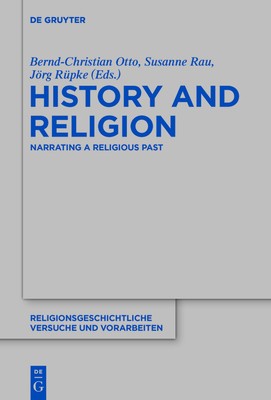
- We will send in 10–14 business days.
- Publisher: De Gruyter
- ISBN-10: 3110444542
- ISBN-13: 9783110444544
- Format: 15.6 x 23.4 x 3 cm, hardcover
- Language: English
- SAVE -10% with code: EXTRA
History and Religion (e-book) (used book) | bookbook.eu
Reviews
Description
History is one of the most important cultural tools to make sense of one's situation, to establish identity, define otherness, and explain change. This is the first systematic scholarly study that analyses the complex relationship between history and religion, taking into account religious groups both as producers of historical narratives as well as distinct topics of historiography. Coming from different disciplines, the authors of this volume ask under which conditions and with what consequences religions are historicised. How do religious groups employ historical narratives in the construction of their identities? What are the biases and elisions of current analytical and descriptive frames in the History of Religion? The volume aims at initiating a comparative historiography of religion and combines disciplinary competences of Religious Studies and the History of Religion, Confessional Theologies, History, History of Science, and Literary Studies. By applying literary comparison and historical contextualization to those texts that have been used as central documents for histories of individual religions, their historiographic themes, tools and strategies are analysed. The comparative approach addresses circum-Mediterranean and European as well as Asian religious traditions from the first millennium BCE to the present and deals with topics such as the origins of religious historiography, the practices of writing and the transformation of narratives.
EXTRA 10 % discount with code: EXTRA
The promotion ends in 19d.19:02:58
The discount code is valid when purchasing from 10 €. Discounts do not stack.
- Publisher: De Gruyter
- ISBN-10: 3110444542
- ISBN-13: 9783110444544
- Format: 15.6 x 23.4 x 3 cm, hardcover
- Language: English English
History is one of the most important cultural tools to make sense of one's situation, to establish identity, define otherness, and explain change. This is the first systematic scholarly study that analyses the complex relationship between history and religion, taking into account religious groups both as producers of historical narratives as well as distinct topics of historiography. Coming from different disciplines, the authors of this volume ask under which conditions and with what consequences religions are historicised. How do religious groups employ historical narratives in the construction of their identities? What are the biases and elisions of current analytical and descriptive frames in the History of Religion? The volume aims at initiating a comparative historiography of religion and combines disciplinary competences of Religious Studies and the History of Religion, Confessional Theologies, History, History of Science, and Literary Studies. By applying literary comparison and historical contextualization to those texts that have been used as central documents for histories of individual religions, their historiographic themes, tools and strategies are analysed. The comparative approach addresses circum-Mediterranean and European as well as Asian religious traditions from the first millennium BCE to the present and deals with topics such as the origins of religious historiography, the practices of writing and the transformation of narratives.


Reviews